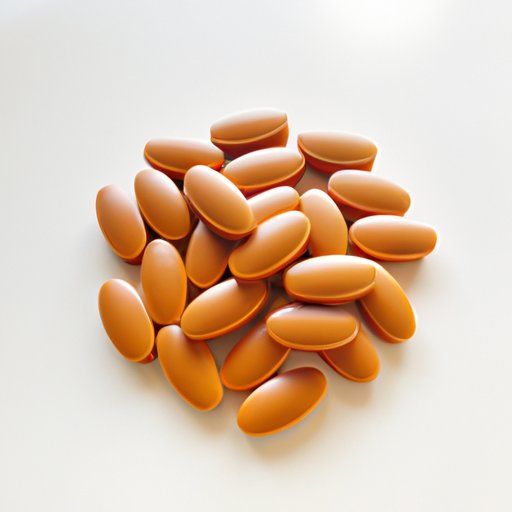
Introduction
Vitamin D is an essential nutrient that plays a vital role in many bodily functions, including bone health, immune system function, and mood regulation. While it can be obtained from sun exposure and certain foods, many people choose to supplement with Vitamin D to ensure adequate intake.
However, determining the appropriate dosage of Vitamin D can be confusing. Some sources recommend taking as much as 10000 IU of Vitamin D per day, while others caution against exceeding the recommended daily intake. In this article, we will explore the benefits and risks of taking 10000 IU of Vitamin D, who may need to supplement with this amount, and what to do if you suspect that you have taken too much.
The Benefits and Risks of Taking 10000 IU of Vitamin D Daily
There are several potential benefits associated with taking 10000 IU of Vitamin D daily. Research suggests that this dosage may help to improve bone health, reduce the risk of certain cancers, and support immune system function.
However, taking such a high dosage of Vitamin D also carries risks. One of the most significant risks is toxicity, which can cause symptoms such as nausea, vomiting, weakness, and kidney damage. Additionally, excessive Vitamin D intake can lead to hypercalcemia, a condition in which there is too much calcium in the blood.
How to Know if You Need to Supplement with 10000 IU of Vitamin D
There are several factors that contribute to Vitamin D deficiency, including age, skin color, and sunscreen use. People who live in areas with limited sunlight exposure or who spend most of their time indoors may also be at risk.
If you suspect that you may be deficient in Vitamin D, there are several ways to determine your blood levels. Your healthcare provider can perform a blood test to measure your Vitamin D levels, or you can purchase a home testing kit. Additionally, some symptoms of Vitamin D deficiency include fatigue, bone pain, and muscle weakness.
The Difference Between 1000 IU and 10000 IU of Vitamin D – A Closer Look
The recommended daily intake of Vitamin D varies depending on age and other factors, but generally ranges from 400 to 800 IU per day. However, some experts recommend higher doses if you are deficient in Vitamin D or have specific health concerns.
The differences between a dosage of 1000 IU versus 10000 IU of Vitamin D can be significant. For example, taking 10000 IU daily can result in much higher blood levels of Vitamin D than taking 1000 IU. It can also increase the risk of toxicity and hypercalcemia. However, some studies suggest that higher doses of Vitamin D may be necessary for optimal health outcomes in certain populations.
Why Taking 10000 IU of Vitamin D May or May Not Be Necessary for Certain Populations
Some populations may be at higher risk for Vitamin D deficiency than others, such as older adults and people with certain health conditions. In these cases, taking a higher dosage of Vitamin D may be necessary to achieve and maintain optimal blood levels.
On the other hand, some people may not need to supplement with Vitamin D at all. For example, those who live in areas with plenty of sunlight exposure or who consume enough Vitamin D from their diet may not need to take a supplement.
What Happens if You Exceed the Recommended Dosage of 10000 IU of Vitamin D?
If you take too much Vitamin D, you may experience symptoms of toxicity, such as nausea, vomiting, and stomach pain. In severe cases, Vitamin D toxicity can lead to kidney damage and cardiovascular problems.
If you suspect that you have taken too much Vitamin D, it is important to seek medical attention right away. Your healthcare provider can perform a blood test to measure your Vitamin D levels and determine whether you need treatment.
Top Supplements for Vitamin D and How They Affect Your Daily Intake of 10000 IU
There are several types of Vitamin D supplements available, including pills, drops, and gummies. The type of supplement you choose may affect how much Vitamin D you are getting per dose.
When selecting a Vitamin D supplement, it is important to read the label carefully and follow the recommended dosage instructions. If you are taking a supplement that provides 10000 IU of Vitamin D per dose, be sure to account for this when calculating your total daily intake.
Conclusion
While taking 10000 IU of Vitamin D daily may have some potential health benefits, it is important to weigh these against the risks of toxicity and hypercalcemia. If you suspect that you may be deficient in Vitamin D, talk to your healthcare provider about whether supplementing with Vitamin D is necessary and what dosage may be appropriate for you. Remember to always follow the recommended dosage instructions on your supplement label and to seek medical attention if you experience symptoms of Vitamin D toxicity.





